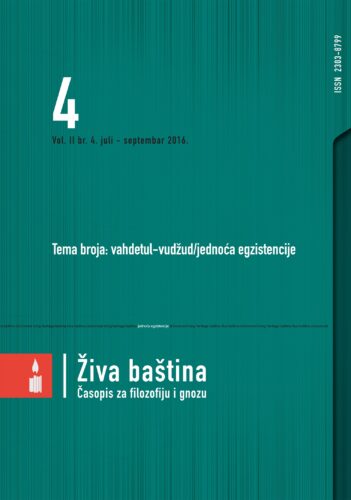Jednoća egzistencije (vahdetul-vudžud) predstavlja temeljno učenje Ibn Arebijevog gnosticizma (irfana). Također i Mulla Sadra, na vrhuncu svoje transcendentne fi lozofi je, krozgradaciju egzistencije stiže do jednoće egzistencije. U pogledu defi niranja jednoće egzistencije postoje neslaganja i na Istoku i na Zapadu. Na Zapadu se fi lozofsko učenje panteizma uspoređuje s ovom teorijom, a nekada se smatra njenim ekvivalentom. Između ova dva gledišta postoje temeljne razlike koje ćemo u ovom radu razmatrati. S jedne strane Ibn Arebi vjeruje da razum ne može pomoću fi lozofskih argumenata pojmiti jednoću egzistencije, zato što prilikom pokušaja racionalnog pojašnjavanja ovog pitanja zapadamo u nerješivi paradoks. Dakle, prema Ibn Arebiju ova teorija je na položaju ponad položaja razuma. Međutim, Mulla Sadra smatra da je ova teorija na položaju razuma te je, kako bi je dokazao, formirao dva demonstrativna argumenta: jedan putem analize pitanja kauzaliteta, drugi preko udubljivanja u načelo nesloženosti bitka (بسيط حقيقيه). Ova dva demonstrativna argumenta prilikom dokazivanja panteizma bili su predmetima zanimanja i Zapadnih mislilaca. Oni su iznijeli različite oblike ovog argumenta i to argument zavisnosti (The Dependency Argument) i argument beskonačnosti (The Infi nity Argument) koji su bili predmetima rasprave. U ovom radu prvo ćemo se pozabaviti arbitražom između Ibn Arebija i Mulla Sadre po pitanju dokazivosti jedinstva egzistencije, a zatim ćemo načiniti komparaciju dva navedena Mulla Sadrina argumenta i argumenata koje o ovoj temi postoje na Zapadu, te ih izložiti kritici.
The Unity of Being and its Logical Demonstrability from Ibn ‘Arabi`s and Mull Sadra`s Point of View
The unity of existence (wahdatul-wujud) represents the fundamental teaching of Ibn Arabi's gnosticism (irfan). Also, at the peak of his transcendental philosophy, Mulla Sadra reaches the unity of existence through the gradation of being (existence). With regard to the definition of the unity of existence, there are disagreements in the East and in the West. In the West, the philosophical teaching of pantheism is compared with this theory and sometimes considered as its equivalent. This paper discusses two fundamental differences between these two viewpoints. On one hand, Ibn Arabi believes that reason cannot understand the unity of existence through philosophical arguments, because with rational explanations of this issue we fall into an unsolved paradox. Therefore, according to Ibn Arabi, this theory occupies the position that is above the position of reason. However, Mulla Sadra holds that this theory occupies the position of reason, whereby, in order to prove it, he formed two demonstrative arguments: one by analyzing the issue of causality, and the other by pondering about the simplicity of being principle ( بسيط حقيقيه ). In the process of proving pantheism, these two demonstrative arguments were the object of interest of Western thinkers. They have presented different forms of this argument: the dependency argument and the infinity argument, which were discussed. This paper first examines the arbitration between Ibn Arabi and Mulla Sadra in terms of the possibility to prove the unity of existence, whereupon the two aforementioned arguments of Mulla Sadra are compared with the Western arguments about this issue and critically analyzed.
[tags]

